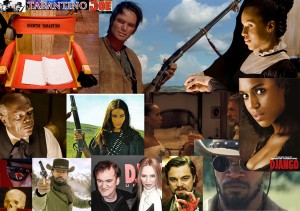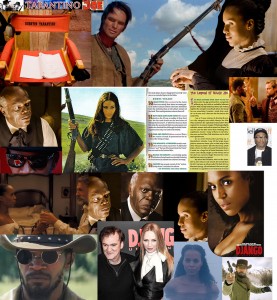Here’s a humble little C&C (compare & contrast) of Tarantino’s movie and script for “Django Unchained.”
http://twcguilds.com/assets/screenplay/django/screenplay.pdf
These are raw notes and I’m not going to bother editing. You get me thinking out loud on many levels from the straight up, straight forward, straight and true, to the anthropological, mythophilosophical and metaforical too. Enjoy!
Carrucan Plantation. My mind wanders to Caracas pretty quickly.
I believe “Field N____” on page 8 of the script is the first use of the ‘N’ word. Spike Lee and others are bothered by what they’re calling overuse of this word but of course the entire movie is about plantation life in the early moments before and after Lincoln’s ever so famous “Emancipation Proclamation.”
It was never clear to me that it was a $20 gold piece to purchase the horse, just a large looking coin. Too easy in today’s society to think maybe it was a Quarter or a Silver Dollar maybe.
Pg 10: King Shultz insists Django name his acquired horse. He has great difficulty agreeing to accept ownership. I wish they would have kept that in the movie. Could have been a great treatment of Indigenous thought versus anglo philosophy.
17: Love the smalll derringer extended from a handshake. Early foreshadowing maybe, of the Three Musketeers references to come.
Umm, afraid to say this out loud but I noticed Quentin Tarantino is not good at a/an with words starting in vowels. “a onion,” “a honest person,” etc. hehehehe
I tend to overthink things now and then, but Town of Daughtry makes the word Husbandry come to mind, like marriage but also animal husbandry, like chattel slavery as well.
THINGS WE MISS in movies that stay in a script:
20: “don’t make any quick movements and let me do the talking,” Django looks at him like, “as if…”
The movie’s signage specified Servant Uniforms I think but I don’t remember seeing “House Negruh,” or “House N___” whereas the script calls for it.
27: A little bit of cognitive dissonance for me in both the movie and the script. Jerry the boy who works with glass. His mama works at the lumber yard. I can’t tell if he’s a white or mixed indentured servant or a kid of a freed slave or what.
Oh Betina ribs Django for wanting to dress in blue Flauntleroy. In the movie he picked it. In the script Shultz made him wear it.
Spyglass the type a Sea Captain might use. Shades of Frederick Douglass maybe.
So “I’m sure he dead,” was an ad lib? Go Jamie Foxx!”
47: “Frankly I’ve never given anybody their freedom before. And now that I have, I feel vaguely responsible for you.”    Wow. I ponder that when looking back at my marriage and divorce. I’ll say no more about that, just that I truly feel like I freed someone who just couldn’t consider herself free and stay married.
54: Django finds Broomhilda, I think in the movie Shultz found out from rumormill or word on the street.
Not sure why the auction complete with bidding was cut out of the film, maybe time constraints?
“A seventy-five year old Indian on a mule makes a bid.” I would’ve wanted Tarantino, someone part Cherokee to expound on that one, that’s for sure.
57: “She climbs into the driver’s seat in more ways than one.” If it can be done, without being too preachy, I would have loved more documentary stuff about free/slave sexuality and also the dynamics and power differentials exploited using ones’ body or someone elses’ body, etc. Is “pony” legit from history? I never read about that before. That’s new to me for sure.
70: “You want me to play a black slaver?? There ain’t nothing lower than a black slaver. Black slavers are even lower than head house N___’s, and buddy that’s pretty F___ing low.”
Mandingo fighting pretty much lines up script and movie both. Even, “He’s just being cheeky…”
Confirmation of Broomhilda’s presence is about the same too.
“Candie gives Django a creepy smile.” Â I don’t remember seeing that in the film.
86: “I pay 500 dollars I want 500 fights. So what about my 500 dollars? You gonna reimburse me?”       The whites (except for Schultz) laugh. He’s comfortable with the wider economy of the deep south in Chattel Slavery but not supportive of it ethically or morally. The script shows that well. I’m not sure the movie does. Only mention I remember is in the saloon while asking Django to hire on as his sidekick.
I didn’t catch in the movie that getting emotional and wanting to pay the 500 was a break in character. In the script I see that.
That Django has seen worse doesn’t come to me in the movie either. I think Tarantino expected both Schultz’s and Django’s characters to be more developed at this point than they already are. Time probably didn’t permit but maybe more could’ve been done in the soundtrack or with visuals maybe.
Calvin blinks. Django wins a staring contest I didn’t notice. I’ll want to see the movie again just to see if it happened and I just didn’t see it.
I think a lot about the fact that all this was just 120 years ago or so. Someone alive today could have a grandparent or four who would be children of recently freed slaves. This is not ancient history, and I feel that many of the attacks on Tarantino’s use of the N word or the very mention of slavery in a comprehensive way for that matter, might be misplacing a defensiveness over their own family name. Or guilt by neutrality maybe.
Similar to issues over Native American genocide if you ask me.
I wonder if Tarantino’s treatment of Stephen (Samuel L. Jackson) comes along from a desire to get the subject of “house N____” back on the table for discussion; it’s been hushed since whatever year Harry Belafonte called Colin Powell one for his “step n fetchit” obedience to Bush’s Iraq war.
Hahahaha. Stephen only misses Calvin Candie like a rock in his shoe in the script. All the other descriptives must be Samuel L. Jackson ad libbing. Script characters that didn’t make it to the movie, but I won’t belabor those details.
The cruelty to mandingos in the script wasn’t something I particularly missed in the film. Good choice not overdoing that I think.
The interaction between Stephen and Django in the Big House might have been illuminating. Freedmen treating a House N___ as if he’s his owner. Shows a lot of deep south dynamics including contemporary emotional issues I bet. Which brings me back to Harry Belafonte and Colin Powell jousting again.
114: The two weeks in boston joke worked much better in the movie than in the script for me. The southern accent probably did it.
Stephen calling Candie’s Boston joke unfunny shows a closeness between the two of them that’s only shown a little bit in the moive. That could’ve helped develop that relationship I think.
Ace Woody telling Django that with Calvin dead Lara probably won’t care much about Mandingo fighting could get into some dynamics too but was probably superfluous to the film. Quite a bit more torture in the script than the movie. Maybe discussed in group was how to imply it without showing everything. Or even just showing a little and not having to belabor the point.
“Seemed like folks never had a bright idea in their life,” says the script but I’m pretty sure Stephen says “white folks” in the film.
146: “Django is damn convincing.”
Damned straight this inner piece of Tarantino writing is a Tall Tale within a Tall Tale that would make Mark Twain proud.
“Instead of [Gambling] chips they play with “N____ ears,” yes the ears of slaves.” Where on earth did you find this?
162 Closeup of Broomhilda as she watches this.
I would’ve liked this kept in the film. Don’t want to give any spoilers but I’ve wanted four characters developed from beginning to end. Django, Hilda, Stephen, and King Schultz.
A lot can be done with eyes and hands.
Last comment for now. I would’ve wanted the song “Follow The Drinking Gourd.” Maybe Richie Havens’ version, maybe mine, hint, hint…
In two places in this movie, maybe a few other places.
Especially whenever the North Star is mentioned.
More about Django?
http://muffinbottoms.org/?p=990
Comparing Navajo Joe with Django.

